Why Does Anemia Cause Hair Loss?
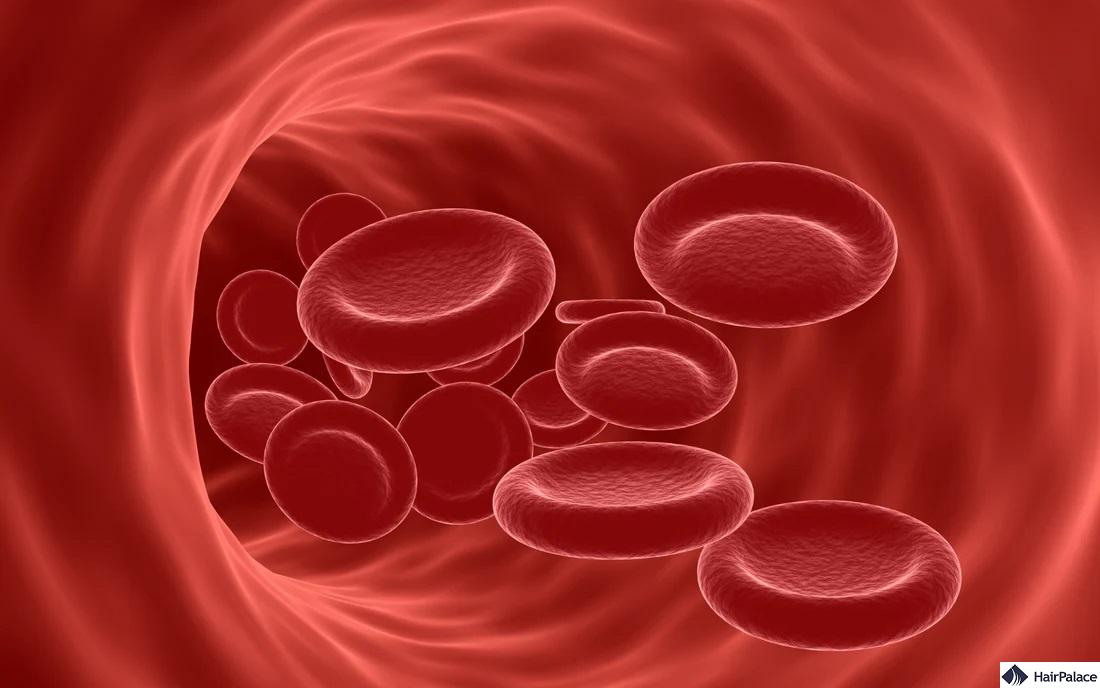
Anemia hair loss occurs when a deficiency in red blood cells or haemoglobin reduces oxygen delivery to hair follicles, weakening them and leading to hair shedding.
Not only do you face the stress of losing your hair, but you might be affected by more pressing health issues that disrupt your quality of life.
WHO estimates that 42% of children less than 5 years of age and 40% of pregnant women worldwide are anemic.
Anemia is one of the most common medical conditions leading to hair loss. But what’s behind it?
- What is anemia?
- Why it causes hair loss
- What it looks like
- How its diagnosed
- Treatment
- Prevention
- When to see a doctor
- FAQ
What is anemia?
Around two billion people worldwide are affected by anemia.
Common symptoms include:
- Feeling weak, dizzy, and/or tired
- A pale complexion
- Struggling to be as active as you would usually
- Shortness of breath after physical exertion
- Heart palpitations
People affected by anemia have a low red blood cell count, and their bloodstream carries less oxygen than the body requires.
This can leave organs and tissues without the right amount of oxygen to stay healthy.
As a result, anemia can cause hair loss as the body diverts oxygen from non-essential cells to crucial ones — leaving follicles unable to produce new hair.

Common types of anemia
Iron deficiency anemia is the most common type of anemia, caused by a lack of iron in the blood.
Iron is required to produce haemoglobin, the protein in red blood cells that carries oxygen.
Hair loss from iron deficiency anemia is temporary, and the best method of treatment it is to address the underlying issue.
Getting iron levels under control will help the growth cycle return to normal and stimulate production of new hair.
Your doctor is likely to prescribe iron tablets, and a healthy amount of oxygen will reach the follicles when haemoglobin levels normalise.
Anemia can also lead to low levels of vitamin B12, known to cause:
- Irritability
- Depression
- Changes in behaviour
- Yellowing of the skin
However, low vitamin B12 may be triggered by certain medications, Crohn’s disease, or even vegan diets.
If you believe you may be affected by any type of anemia, speak to your GP as soon as possible.
Why anemia causes hair loss
Anemia and hair loss typically go hand in hand.
Certain tissues and organs may be unable to function as they should without the right amount of oxygen. This also includes hair follicles and can lead to thinning hair anemia.
Hair growth occurs in cycles, with four stages.
Once follicles enter the resting stage (telogen), their lack of oxygen leaves them without the energy they need to transition to the growth (anagen) stage.
Hair shed from the scalp won’t be replaced, and hair loss will occur.
The effects of anemia related hair loss may resemble pattern baldness in both males and females.
Extreme shedding or baldness can be an upsetting outcome of anemia, particularly for men and women who consider hair a key part of their identity.
If you’re worried that an iron deficiency is influencing your hair health, the best course of action is to seek professional medical advice.
They’ll be able to identify an iron deficiency by looking at your blood levels and establishing a proper diagnosis.
What does hair loss due to iron deficiency anemia look like?
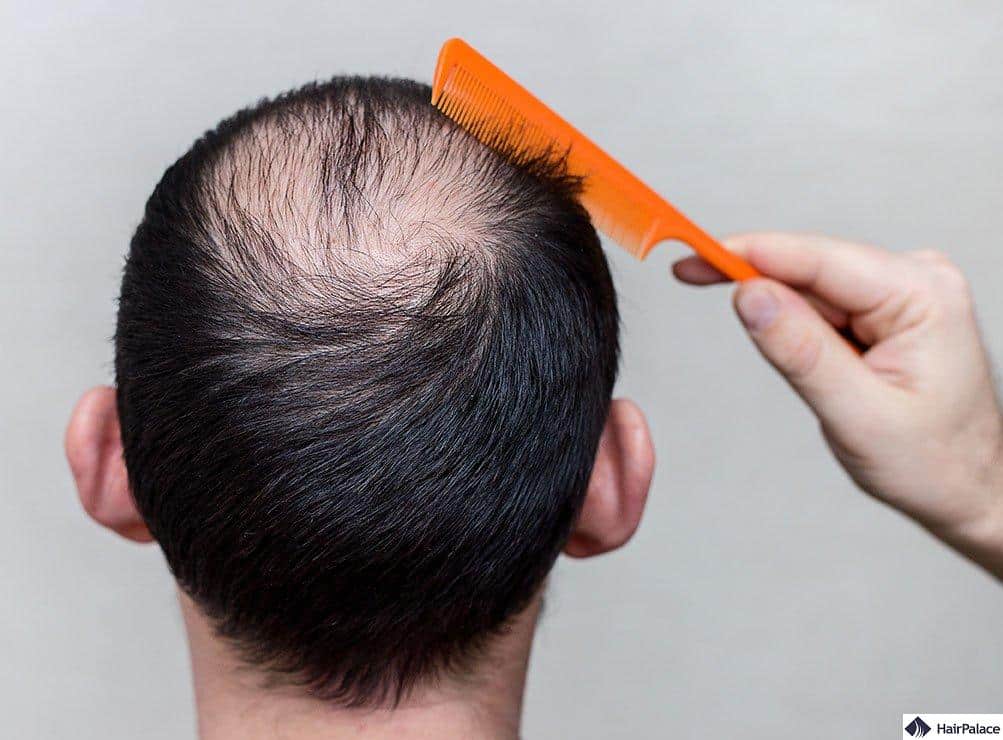
Hair loss due to iron deficiency anemia usually looks like male and female pattern hair loss.
Anemia hair loss symptoms are often very similar to that of hereditary hair loss.
Research published in the Journal of Korean Medical Science found that iron intake plays a role in the health of hair follicles.
The same study also showed that not having enough iron can cause hair to fall out in the same way it does with patterned hair loss.
If you’re experiencing iron deficiency hair loss you might notice more hair going down your shower drain or staying in your hairbrushes.
In extreme cases, you may also notice bald areas on your scalp.
Diagnosing an iron deficiency
If you believe that there is a potential relationship between your hair loss and a deficiency of iron, you should consult with a doctor to establish a proper diagnosis and discuss treatment options.
You might feel inclined to self-diagnose and take an iron supplement but they may cause certain side effects, and your attempt at self-treatment may backfire.
To find out whether you’re iron deficient, your doctor will most likely ask about your medical history and symptoms.
After a thorough physical exam, your healthcare provider will likely run a blood test to check how much iron is stored within your body.
Your doctor is also likely to check your haemoglobin and hematocrit levels.
These tests are considered the most efficient and cost-effective way to diagnose an iron deficiency.
If the test determines that you have low iron stores and you’re experiencing hair loss, you will most likely have to undergo further tests to identify the exact reason behind your deficiency.
Thankfully, iron deficiency anemia is usually treatable.
How do you treat iron deficiency and hair loss?
Thinning hair caused by iron deficiency anemia typically doesn’t lead to a permanent loss of hair.
The best way to resolve the issue is to treat the underlying cause of the problem.
1. Iron supplements
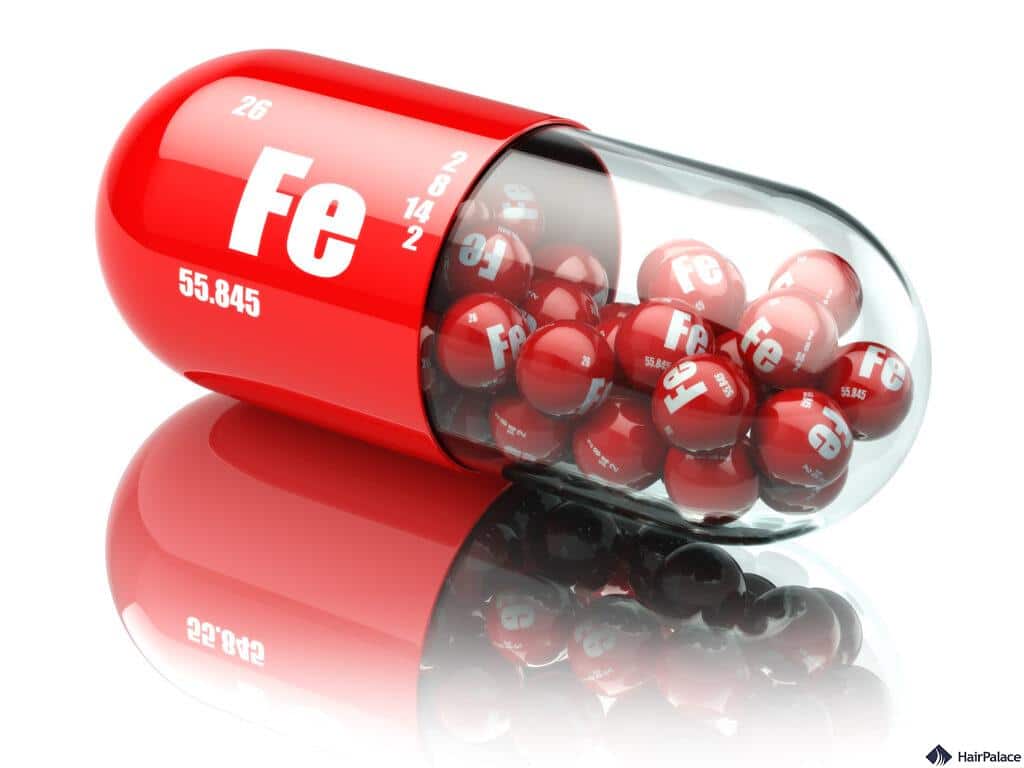
Your doctor may recommend you take iron supplements to treat your iron deficiency.
You may have to take the supplements for 3 to 6 months before your iron levels return to normal.
However, it’s important not to start with such treatments without consulting with a doctor first, even if you’re certain that your body isn’t getting enough iron.
365 vegan tablets of 14 mg iron cost £7.95 on Amazon from Howard & James.
2. Iron injections
If you have critically low iron stores, your doctor may administer iron injections to raise your iron levels faster.
This is especially common in treating people with Crohn’s disease, a health condition where the body can’t absorb iron properly.
3. Iron-rich diet
Consuming more iron can also help your body absorb the required amount.
Iron-rich foods include red meat, chicken, fish, legumes, and dark leafy greens.
You should aim to follow the Recommended Dietary Allowance (RDA) of iron.
This represents the average daily intake you need to meet the nutritional requirements of your body.
The suggestions for iron in milligrams are:
- Females 9–13 years: 8 mg/d
- Females 14–18 years: 15 mg/
- Females 19–50 years: 18 mg/d
- Females 51+ years: 8 mg/d
- Males 9–13 years: 8 mg/d
- Males 14–18 years: 11mg/d
- Males 19+ years: 8 mg/d
Pregnant women of any age should aim to take 27 mg/d, 10 mg/d for lactating women 14–18 years, and 9 mg/d for lactating women 19–50 years (NIH, n.d.).
Regrowth
Many products on the market claim to regrow hair, but experts estimate that about 99% of these products don’t do anything to stimulate hair growth.
Stick to treatments recommended by medical clinics and the NHS. These include:
1. Minoxidil (Rogaine)
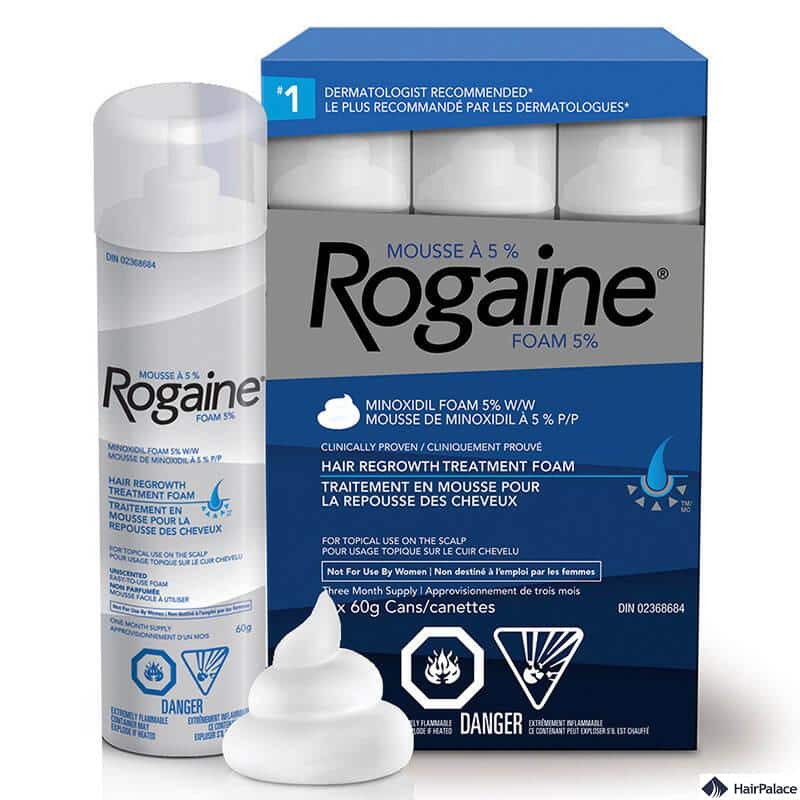
Minoxidil is an over-the-counter medication available in liquid or foam form.
You’re supposed to rub the solution into your scalp twice a day to promote hair growth and improve hair health.
A 3 month supply of Rogaine costs £68.00 on Amazon.
2. Finasteride (Propecia)
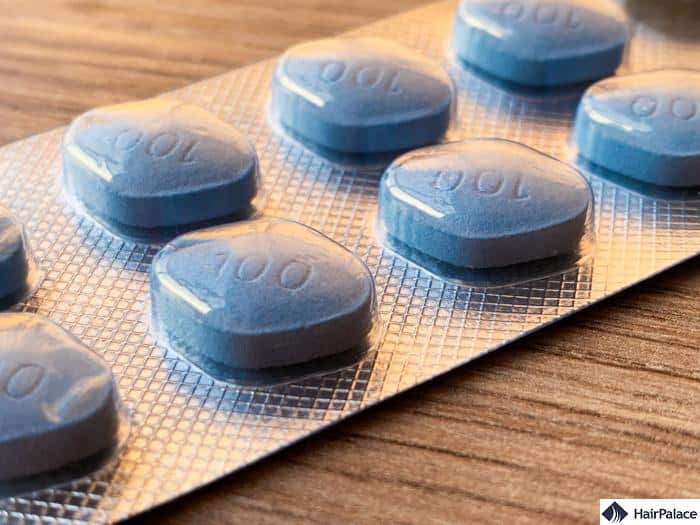
Finasteride and minoxidil are the only two clinically approved hair loss treatments.
Propecia is only available to men in a pill form. It can slow hair loss by reducing the amount of DHT your body produces.
Finasteride may cause serious side effects such as erectile dysfunction, and ejaculation disorder among others.
It is a prescription-only medication, 28 pills of generic Finasteride cost £13.99 on Menschem.
3. Surgery
While surgery doesn’t promote any new growth, it is a great option for those suffering from androgenetic alopecia or a form of permanent hair loss.
Hair transplantation works by taking healthy hair follicles from a donor area (usually the back or sides of the head) and redistributing them into the areas affected by baldness.
Can you prevent iron deficiency and hair loss?
To reduce the chance of your hair falling out, you should:
- Eat a healthy diet: Make sure to include leafy green vegetables and lean proteins to have a balanced diet and ensure you get enough dietary iron.
- Increase your vitamin C intake: Eat more oranges, strawberries, melons, broccoli, or tomatoes- All of these foods allow your body to absorb a higher amount of iron and function more efficiently.
- Avoid tight hairstyles: Wearing your hair in tight buns or ponytails can cause traction alopecia.
- Protect your head: Keep your head covered on exceptionally warm or cold days to protect your hair follicles from the elements.
- Treat your hair gently: Avoid harsh brushes, chemicals, and hair dyes. You should also limit the use of heat-styling products such as blow dryers, or hair straighteners.
When to see a doctor
If you believe you may be affected by anemia, and experiencing common anemia symptoms alongside hair loss, consult your GP.
They may be able to prescribe iron tablets and recommend you change your diet to consume more iron naturally.
Treating the underlying cause of anemia-related hair loss should help to promote healthy hair growth.
However, in cases of permanent hair loss, hair transplants may be an option once the root cause is addressed.
Cutting-edge hair transplants can create natural results using existing hair from the scalp, ensuring transplanted hair blends seamlessly.
To learn more about hair transplant surgery for different types of hair loss, speak to a member of our expert team today!
FAQ
Iron deficiency anemia occurs when a patient lacks the required amount of iron in their system, or they have a condition that prevents their body from using iron correctly. A severe case may lead to fatigue, chest pains, and shortness of breath as well as hair loss.
When related to anemia, hair loss may be reduced by increasing your vitamin C levels, as this aids the body’s iron absorption. You can do this by eating more vitamin C-rich foods, such as peppers and oranges, or by taking iron supplements in more extreme cases. This can promote hair regrowth and reduce the risk of further hair loss.
Hair loss can be a sign of anemia, especially iron deficiency anemia.
Hair loss related to an iron deficiency may appear similar to traditional male (or female) pattern baldness. It’s believed that iron plays a significant part in hair loss and can lead hair to fall out in a process similar to that of male and female pattern baldness.
People affected by anemia lack the usual amount of red blood cells, and this can lead to complications if it remains untreated for a long time. These include poor immunity, extreme weakness, and even heart failure.
Iron deficiency anemia is known to lead to hair loss, and thinning.
Hair usually grows back after anemia is treated, as long as the underlying iron deficiency or anemia cause is addressed and corrected.
To stop hair loss from anemia, treat the underlying cause by increasing iron levels through a balanced diet rich in iron (e.g., spinach, red meat, legumes) or supplements, as prescribed by a doctor. Ensure proper intake of vitamin C to enhance iron absorption and address any other deficiencies like B12 or folate.
Last medically reviewed on January 16th, 2025
- Iron-deficiency anemia. (n.d.)https://www.nhlbi.nih.gov/health-topics/iron-deficiency-anemia
- Trost, L. B., Bergfield, W. F., & Calogeras, E. (2006, May). The diagnosis and treatment of iron deficiency and its potential relationship to hair loss. Journal of the American Academy of Dermatology, 54(5), 824 – 844https://www.jaad.org/article/S0190-9622(05)04745-6/fulltext
- KLIGMAN AM. Pathologic Dynamics of Human Hair Loss: I. Telogen Effluvium. Arch Dermatol. 1961;83(2):175–198. doi:10.1001/archderm.1961.01580080005001
- KARADAĞ, AYŞE SERAP; ERTUĞRUL, DERUN TANER; TUTAL, EMRE; and AKIN, KADİR OKHAN (2011) "The role of anemia and vitamin D levels in acute and chronic telogen effluvium," Turkish Journal of Medical Sciences: Vol. 41: No. 5, Article 10.https://doi.org/10.3906/sag-1005-853
- Harrison S, Sinclair R. Telogen effluvium. Clin Exp Dermatol 2002;27:389-95.
- Schrier SL. Causes and diagnosis of anemia due to iron deficiency. November 6, 2003
- Thiedke CC. Alopecia in Women. Am Fam Physician 2003;67:1007-14.


